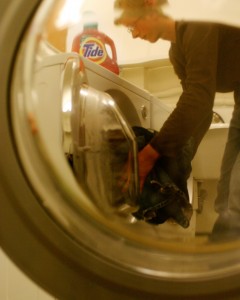Reusable to-go containers, high-efficiency washing machines and florescent light bulbs are a few of the many changes the Gustavus campus has undergone as a way to convert to new energy-efficient and pro-green policies.
Dining Services is phasing out paper to-go boxes and has introduced reusable containers, or “GustieWare.” Dining Services Director Steve Kjellgren estimates 250,000 cardboard to-go boxes were used and thrown away by students every year.
 Because the dining service is à la carte instead of an all-you-can-eat, it helps cut down on waste. “There’s a connection between every glass of milk and a banana that you as a consumer put on your plate and a value. So you know that if that glass of milk costs 80 cents and that banana costs 70 cents, you’re not going to take four glasses of milk and five bananas, where in an all-you-can eat situation you will, because you won’t want to go back. … [People] take two or three bananas, and if they don’t want them they throw them away.”
Because the dining service is à la carte instead of an all-you-can-eat, it helps cut down on waste. “There’s a connection between every glass of milk and a banana that you as a consumer put on your plate and a value. So you know that if that glass of milk costs 80 cents and that banana costs 70 cents, you’re not going to take four glasses of milk and five bananas, where in an all-you-can eat situation you will, because you won’t want to go back. … [People] take two or three bananas, and if they don’t want them they throw them away.”
Physical Plant has also been working alongside Dining Service in the environmental initiative. Most of the thirty-two watt fluorescent light bulbs om the Market Place have been replaced with twenty-five watt bulbs. Although this would normally mean less power and less light, Director of the Physical Plant Warren Wunderlich explained, “Theoretically, it will produce as much light, if not more light. We’ve heard a couple of other places doing it. … So we had a student working here this summer and that was part of his priorities [to research the possibility of having it on our campus.” Wunderlich noted that in addition to saving energy, the lower-watt bulbs save the campus money. Other lighting projects across the campus include sensors that turn off or dim lights whenever a room is empty or there is sufficient sunlight.
This past summer, high-efficiency washing machines were installed in all the dormitories. These machines run on a special detergent and will save both resources and money. Sophomore Psychology Major and Collegiate Fellow in the Carlson International Center Victoria Hidalgo Gonzalez said, “I don’t understand how they work, but they save the college water and money, and they do a good job cleaning our clothes.”
About $40,000 wasspent during the summer to replace many of the toilets. These toilets were in older buildings and predated legislation that mandated that toilets flushed no more than 1.6 gallons of water. “Fifty percent of the toilets [were] older than that and flushed three, four gallons. We replaced those with 1.1 gallon or 1.28,” said Wunderlich. This effort came about due to rising costs of water, and Wunderlich expects that in three years Gustavus will see substantial savings in both money and gallons of water.
Head of the Johnson Center for Environmental Initiative Jim Dontje said, “We have a unique situation where we can both do and teach at the same time. We need to change ourselves as we teach students to go out and make change in the world.
” One of the projects in which he is involved is the planning of a new academic building. “Environmental concerns, such as energy, but also material use and the quality of the space and the day lighting and air quality, are all part of the discussion.”
Dontje sees some of the campus’s changes not coming from the campus itself, but from outside. “Maybe we’ll be looking to the wider community for the changes. The utilities might be making some changes [to electricity] that might pay for that.”
Dontje, Kjellgren and Wunderlich realize there are still more challenges to overcome. Dontje says the solution to the campus’ energy consumption could be installing wind turbines. For Dining Services, there is still the issue of food waste, and Kjellgren wants to see a compost established in a few years.
Wunderlich has been able to make cost-saving changes, but says the campus’s greatest environmental challenge-replacing fossil fuels with alternative sources-will be costly.
“As we proceed, we’re going to be bumping up into some more expensive alternatives, and perhaps a decision [may be called for] to do them even though the economic payback might not be as good, just because it’s the right thing to do,” said Wunderlich. “At some point these become motivated by doing the right thing instead of saving the most money.
Photo By: Sarah Cartwright